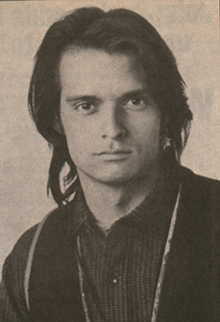Talking to Canadian and American television executives who are trying to bury the hatchet of native stereotypes is to travel first hand the medium’s schizophrenic landscape of the good, the band and the ugly. First the good news. Although old Hollywood western series still abound on the tube, and with them the idea of the ferocious savage clothed in buckskin, at least two programs, The Young Riders and Paradise, are attempting a more honest approach to the history of the "Old West" and the role of the aboriginal players.
"You won’t see in this series 75 Indians (for example) shot out of their saddles to the cheers of the audience," says Ed Spielman, creator of The Young Riders, which is produced by MGM Television and aired this season on ABC and CTV. "We try to portray Native Americans as valuable. Native culture has been one of the most contributive, and it’s got none of the PR."
In The Young Riders, Spielman chose characters who were representative of the 1860s, including Buck Cross (Gregg Rainwater) who is part Kiowa. "If you’re going to use a people’s culture in the guise of entertainment, you damn well better get it right as best you can," explains Spielman.
For his part, Rainwater believes the show’s writers show a lot of respect. In the opening episode, for example, Cross teaches Indian sign language to mute rider Ike McSwain (Travis Fine), and demonstrates skill in identifying animal tracks and tribal arrows that later help to capture the correct villains.
"I feel a responsibility to native Americans not to do anything stereotypical or insulting," says Rainwater, who, like Cross, is of mixed ancestry but grew up in Detroit.
Cross is Rainwater’s first major TV role, after five years in Los Angeles. "The best thing about this (TV) part is the knowledge that I’m gaining about Indians. I’ve always had a great respect for the ‘old ways,’ says the 23-year-old actor. "I’ve met some medicine men and native dancers, people who have maintained a part of the old traditions."
Although some attitudes have changed for native actors in film, it’s a "gradual change," notes Dehl Berti, who plays John Taylor in Paradise, produced by Lorimar Television for CBS and seen on CHCH. "It’s a landmark role in that it’s a positive character," says Berti of his current character who is friend to Ethan Cord (Lee Horsley) and mentor to the children.
Berti represents an older generation of native actors who endured decades of Hollywood stereotypes. "The Indians were the antagonists. I’m a Chiricahua Apache, which was John Ford’s favorite ‘heavy,’" chuckles Berti, whose colleagues among native actors include the likes of Jay Silverheels (The Lone Ranger, Will Sampson on One Flew Over the Cuckoo’s Nest) and Chief Dan George (Little Big Man).
In changing stereotypes, feature films influence TV producers, says Jim Conway, supervising producer of Paradise. "The American consciousness caught up to itself in regard to how we basically stole land and changed the laws to suit our fancy," he says. "Now, it’s become the job of storytellers and filmmakers whenever possible to put the Native American into the proper light," Yet some stereotypes continue, says Berti, who publicly criticized the 1989 feature film War Party. "They showed a shaman as a drunken Indian, which is a total impossibility. Then, of course, the two leads (portraying Indians) were not Indians."
Unfortunately, the past season of Bordertown, a current Canadian-made western series, failed to match the integrity of its American counterparts. Co-produced by Canada and France for CTV and The Family Channel, Bordertown’s attempts to tell stories of historic injustice only romanticize native people as monosyllabic, helpless victims. Bordertown’s producer Jana Veverka acknowledges the shortcomings of the first 1989-1990 season. The second season, already airing on The Family Channel in the United States, is composed of segments with more authentic, stronger stories, she says.
The upshot of all this is that you can dismiss TV westerns as innocent entertainment, or ask the more provocative question: Which of these TV images influence our own attitudes and understanding about real-life native people and their cultures today?
Back to Articles

